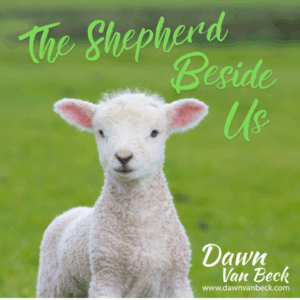
Let’s talk sheep.
Jesus talks a lot about sheep. Throughout most of the book of John, chapter 10, He speaks of sheep as an analogy for His people, His followers.
“Therefore, Jesus said again, “I tell you the truth, I am the gate for the sheep. All who ever came before me were thieves and robbers, but the sheep did not listen to them. I am the gate; whoever enters through me will find pasture. The thief comes only to steal and kill and destroy; I have come that they may have life, and have it to the full” (John 10:7-10).
A shepherd guards the gate to keep wolves out. He guides his flock to green pastures where they find their supply of life. Jesus illustrates how He is the gatekeeper and the good shepherd for each of us. He guards and protects us (His sheep) from danger. He leads us to places of abundance where we find nourishment, comfort, and peace. Resting in the pasture God provides, we find a permanent state of enjoying all we need to live the full, abundant life He desires for us.
Now, you may be thinking this all sounds great and wonderful, but are you and I really being compared to sheep? Is this good or bad? Hmmmmm.
The prophet, Isaiah, suggests we all are “like sheep” and “have gone astray;” “each of us has turned to our own way” (Isaiah 53:6). Research suggests that sheep tend to wander off from the flock and become lost, giving them a common, negative description. Therefore, we assume they are dumb, stupid.
Sheep get a bad rap.
I have a feisty Dachshund named Lilly, who obeys me, most of the time.
She stops what she’s doing when I admonish her. She comes running when I call out her name. She sits at attention and listens for my direction. Lilly is not always successful in her efforts to follow me though. She has her own will. She sometimes wanders off or gets sidetracked, or even lost (mostly due to any nearby lizard diversion). Overall, despite her lizard distractions, Lilly has a sincere intent to please and obey me.
Reflecting on our likeness to sheep, my Lilly comes to mind. I am her gatekeeper, protecting her from harm. I am her shepherd, leading her to sources of sustenance and comfort. Even though she occasionally becomes preoccupied with lizards (and goes astray), she follows me, because . . . she knows my voice.
Jesus speaks again, providing an action step on our part.
My sheep listen to my voice; I know them, and they follow me
(John 10:27).
If we desire to be led, we must listen to our leader.
Sheep are not dumb. They are dependent. And they know the voice of their shepherd.
A flock of sheep has a dependent relationship with their shepherd. They require guidance to identify the proper fields to graze in. Given they are easy targets, they need protection from swift, aggressive wolves. Sheep can live with little worries because they enjoy the direction, protection, and strength of their shepherd who leads them so they can thrive.
We, too, are dependent, which is most definitely not a weakness or defect, but rather, a blessing.
How glorious it is to rest under the direction and protection of our shepherd, Jesus. He leads us to lush pasture where there is fulfilling refreshment and shelter from the elements. He does not keep us on a leash (like I do with Lilly) but allows us to freely roam, provided we remain within reach of His voice.
How do we hear His voice?
- Eliminate any sin barriers that may prevent you from hearing God’s voice.
- Read the Bible. Reading Scriptures helps you discover God’s promises and who He is.
- Your prayer conversations provide intimate communication with God.
- Get Quiet. Cut out the noise in your life so you are ready to listen and hear
We must trust our leader, Jesus, and listen attentively to His voice. This is how God will lead us to the richest and safest of life-giving pastures.
Father God, I praise and thank you for being my good shepherd. Help me hear your voice above all others and to follow where you lead me. I rest in your good and perfect care today. Amen.